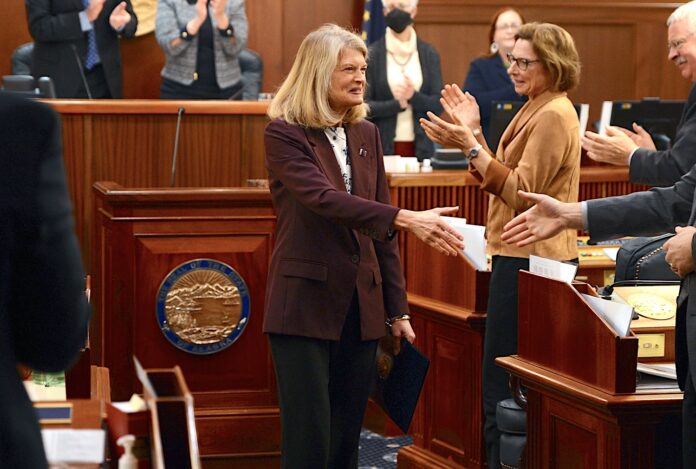
WASHINGTON (States Newsroom) — Some Republicans are raising concerns about how reducing the federal workforce by potentially hundreds of thousands of people and canceling spending approved by Congress will affect the country — especially the regions filled with loyal GOP voters.
Members of Congress are urging the Trump administration not to fire federal workers they view as essential to their regions, pressing back on plans from the U.S. DOGE Service to slash jobs and funding.
Alaska Republican Sen. Lisa Murkowski posted on social media that the more than 100 workers in her home state could be swept up in the dismissals.
“Many of these abrupt terminations will do more harm than good, stunting opportunities in Alaska and leaving holes in our communities,” Murkowski wrote. “We can’t realize our potential for responsible energy and mineral development if we can’t permit projects. We will be less prepared to manage summer wildfires if we can’t support those on the front lines. Our tourism economy will be damaged if we don’t maintain our world-class national parks and forests.”
Murkowski wrote that she supported President Donald Trump’s efforts to reduce the federal government but added the current “approach is bringing confusion, anxiety, and now trauma to our civil servants—some of whom moved their families and packed up their whole lives to come here.”
“Indiscriminate workforce cuts aren’t efficient and won’t fix the federal budget, but they will hurt good people who have answered the call to public service to do important work for our nation,” Murkowski added.
Kevin R. Kosar, senior fellow at the American Enterprise Institute, a conservative think tank, wrote in a social media post “the DOGE push to downsize government employees will hit the coalition that elected Trump.”
He linked to an article from the Wall Street Journal that used maps to show how many federal workers are housed in each congressional district, many of which are represented by Republicans. The GOP controls the House by a slim 218-215 majority, with two vacancies.
Kosar wrote in a separate post that efficiency means “achieving maximum productivity with minimum wasted effort or expense.”
“Done right, cost-cutting can increase efficiency,” he wrote. “But cost-cutting done sloppily can decrease productivity and effectiveness.”
More workers than Walmart
Most of the federal government’s 2.3 million employees aren’t based in and around Washington, D.C. They are spread throughout the country and often make up core parts of the economy in rural areas and sections of the nation that regularly swing between voting for Democrats and Republicans.
For example, Georgia hosts about 80,000, Michigan holds 30,000 and Pennsylvania has 66,000, according to data from the Office of Personnel Management. All three swing states backed Trump in 2024, but have also elected Democrats in statewide races, like governor or U.S. senator.
The Pew Research Center writes in an explainer on the federal workforce that less “than a fifth of the workers in OPM’s database – about 449,500 – work in the District of Columbia or the adjoining states of Maryland and Virginia.”
OPM’s total number of federal workers, Pew writes, doesn’t include 600,000 U.S. Postal Service workers or 1.3 million active duty military personnel.
Even with those two workforces set aside, the 2.3 million federal employees covered by OPM’s data make the federal government “the nation’s single largest employer, with even more workers than Walmart, Amazon or McDonald’s.”
“In fact, the Postal Service by itself would, if it were a private business, rank among the 10 largest private-sector employers, ahead of industry rivals UPS and FedEx,” Pew writes.
Shipyard defended in Maine
Firing a large percentage of federal workers, especially those at the Department of Defense, has lawmakers concerned for local economies and national security.
Maine Republican Sen. Susan Collins, chair of the Senate Appropriations Committee, and New Hampshire Democratic Sen. Jeanne Shaheen, a senior member of the Senate Armed Services Committee and co-chair of the Senate Navy Caucus, sent a letter to the acting Navy Secretary asking for an exemption for Maine’s Portsmouth Naval Shipyard employees to the deferred resignation program.
“In our states, Portsmouth Naval Shipyard (PNSY) has nearly eight thousand civilian employees, creating more than $1.5 billion in annual economic impact in surrounding communities,” Collins and Shaheen wrote.
They added the submarines built at the shipyard are a central part of the country’s national security strategy, especially when it comes to China.
“As our military’s ‘pacing threat,’ the People’s Republic of China, is rapidly expanding its nuclear weapons programs, the role that our own submarines play in the survivability of our nuclear triad cannot be overstated,” Collins and Shaheen wrote.
FBI and Louisiana
Louisiana Republican Sen. Bill Cassidy raised concerns about the impact firing employees at the Federal Bureau of Investigation would have on the state.
“I am all for efficiency and ultimately downsizing the federal government, but firing large numbers of new FBI agents is not the way to achieve this,” Cassidy wrote in a social media post. “Louisiana specifically benefits from newly hired FBI agents. We need to add to our law enforcement, not take away.”
Lawmakers from throughout the country are also learning how funding cuts, like a proposal from the National Institutes of Health to cap Facilities and Administrative costs at 15%, would affect employment, medical research and universities in their states.
While that specific proposal is currently halted by a federal court order, university leaders throughout the country, including those in deeply red states like Oklahoma, are talking with their members of Congress about the negative repercussions.
OU President Joseph Harroz Jr. told Oklahoma Voice the university is talking with federal lawmakers about how the cap would affect the school and “proactively considering next steps.”
“As we know, this change would severely impact institutions’ abilities to fund medical breakthroughs and novel therapies, as well as fulfill our educational mission of training and preparing the next generation of graduate students and student researchers,” Harroz said in a statement. “… The OU enterprise across our campuses is assessing budget implications and continues to be engaged and thoughtful about best ways forward. We are also working in collaboration with OU Health, as its patients’ access to our life-altering clinical trials may also be affected.”
Kansans rally to protect Food for Peace program
Members of Congress are also introducing legislation to curb impacts of spending cuts on programs they view as essential to Americans.
U.S. Rep. Tracey Mann and U.S. Sen. Jerry Moran, both Republicans from Kansas, plan to introduce a bill that would move management of the Food for Peace program from the U.S. Agency for International Development to the Agriculture Department.
Moran said during a floor speech last week that the Food for Peace program purchased $713 million of U.S.-grown commodities during fiscal year 2023, “putting money back into the hands of farmers.”
“In rural America, food assistance programs like Food for Peace put American-grown products in the hands of the hungry, and this food is a tangible extension of the hard work and dedication of farmers and ranchers,” Moran said.
Federal workers in toss-up districts
There are also thousands of federal employees spread throughout the 18 House districts identified as toss-up races by The Cook Political Report with Amy Walter, according to a report from the nonpartisan Congressional Research Service.
The eight GOP-held House seats that could swing to Democrats following the 2026 midterms include Arizona’s 6th Congressional District, currently represented by Rep. Juan Ciscomani and home to about 15,000 federal workers.
Iowa Rep. Mariannette Miller-Meeks, elected by voters in Iowa’s 1st Congressional District, has about 11,000 federal employees.
Pennsylvania’s 10th Congressional District, home to roughly 13,000 federal employees, is represented by Rep. Scott Perry.







